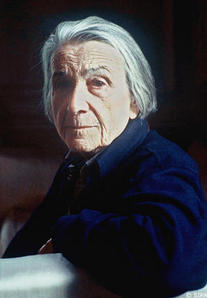Great Throughts Treasury
This site is dedicated to the memory of Dr. Alan William Smolowe who gave birth to the creation of this database.

Nathalie Sarraute, fully Nathalie Tcherniak Sarraute
Russian-born French Novelist, Essayist and Playwright
"Today, thanks to technical progress, the radio and television, to which we devote so many of the leisure hours once spent listening to parlor chatter and parlor music, have succeeded in lifting the manufacture of banality out of the sphere of handicraft and placed it in that of a major industry."
"Suspicion is one of the morbid reactions by which an organism defends itself and seeks another equilibrium."
"It's the duty of all novelists, all painters, all musicians, all people who try to make art move: to look for something they feel authentically, without paying attention to styles."
"Television has lifted the manufacture of banality out of the sphere of handicraft and placed it in that of a major industry."
"What is hidden beneath the interior monologue an immense profusion of sensations, images, sentiments, memories, impulses, little larval actions that no inner language can convey, that jostle one another on the threshold of consciousness. . "
"It's a question of not copying the masters, to look for something, good or bad, for oneself. To enter this liberated state of mind, one cannot copy the others."
"All psychological research is completely barred by the interpretations of the psychoanalysts. Everything happens in the unconscious, and I don't know what this unconscious is."
"I don't admire Freud as much as some people do. Imagine Shakespeare being aware of the Oedipal complex when he wrote Hamlet. It would have been a disaster."
"I have never sought the reason why I write."
"Literature is always trying to show other parts of this immense universe in which we live. It's endless. I'm sure there will be other writers who will discover new worlds."
"I have often heard that the novel is dead. But I see novels produced, I don't know how many a week, in France. I have the impression it's carrying along quite well."
"One can't write without having read - you have to read before beginning to write - and universities offer a very good opportunity to read."
"One can't write for all readers. A poet cannot write for people who don't like poetry."
"I started to write in 1932, when I composed my first Tropism. At that time, I had no preconceived ideas on the subject of literature and this one, as were those that followed it, was written under the impact of an emotion, of a very vivid impression. What I tried to do was to show certain inner ?movements? by which I had long been attracted; in fact, I might even say that, ever since I was a child, these movements, which are hidden under the commonplace, harmless appearances of every instant of our lives, had struck and held my attention. In this domain, my first impressions go back very far. These movements, of which we are hardly cognizant, slip through us on the frontiers of consciousness in the form of undefinable, extremely rapid sensations. They hide behind our gestures, beneath the words we speak and the feelings we manifest, all of which we are aware of experiencing, and are able to define. They seemed, and still seem to me to constitute the secret source of our existence, in what might be called its nascent state. And since, while we are performing them, no words express them, not even those of the interior monologue ? for they develop and pass through us very rapidly in the form of frequently very sharp, brief sensations, without our perceiving clearly what they are ? it was not possible to communicate them to the reader otherwise than by means of equivalent images that would make him experience analogous sensations. It was also necessary to make them break up and spread out in the consciousness of the reader the way a slow-motion film does. Time was no longer the time of real life, but of a hugely amplified present."
"Women have seen that they have locked themselves up with feminist writing."
"The novel moves like all the arts. It's transforming itself all the time."
"The act of writing is a kind of catharsis, a liberation, but I never really concerned myself with that. I write because it interests me."
"The reader has to be creative when he's reading. He has to try to make the thing alive. A good reader has to do a certain amount of work when he is reading."
"These movements seemed to me to be veritable dramatic actions, hiding beneath the most commonplace conversations, the most everyday gestures, and constantly emerging up on the surface of the appearances that both conceal and reveal them. The dramatic situations constituted by these invisible actions interested me as such. Nothing could distract my attention from them and nothing should distract that of the reader; neither the personality of the characters, nor the plot, by means of which, ordinarily, the characters evolve. The barely visible, anonymous character was to serve as mere prop for these movements, which are inherent in everybody and can take place in anybody, at any moment."
"Those who live in a world of human beings can only retrace their steps."